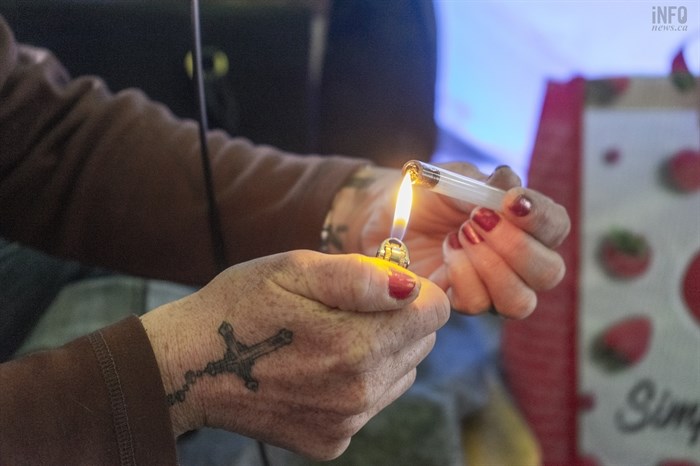
FILE PHOTO - A drug user heating up a meth pipe.
(DAN WALTON / iNFOnews.ca)
April 20, 2023 - 10:50 AM
Interior Health has emailed all municipalities in the Southern Interior, asking the local governments to hold off on any bylaws to ban open drug use in parks.
“We, Interior Health Medical Health Officers recommend a six-month observation period to monitor the effects of decriminalization on public consumption before implementing new bylaws or modifying existing ones,” the letter, signed by six medical health officers and sent to iNFOnews.ca today, April 20, says.
“This would allow staff to monitor the situation to determine if there is in fact an increase in public drug use and give council the time to seek sound public health advice.”
The letter was sent to municipalities on April 14, but only released to the public today, so they had time to ask questions, according to Interior Health.
It comes in response to a growing number of Interior communities introducing bylaws that restrict or ban the open use of drugs in parks, now that the possession of certain drugs has been decriminalized. So far, those communities include Sicamous, Penticton and Kamloops.
READ MORE: Sicamous leading the way in banning drug use in parks
The health authority says most users consume in private spaces or designated consumption sites.
“Punitive approaches (usually ticketing/fines, which can escalate to jail if someone cannot afford to pay) would be perpetuating the harms we are trying to reduce with this exemption,” the letter says. “These harms also include stigma and shame that force people to conceal their substance use and use alone, increasing their risk of dying from substance poisoning.
“A small group may be forced to consume their substances in more public spaces, typically because they do not have access to alternative spaces (e.g. they are houseless, they have an unsafe home environment, or supervised consumption isn’t available for their substance or at the time they need to access it).
“As such, one important strategy to decrease consumption in public places is to offer safe and appropriate consumption spaces such as overdose prevention sites or supervised consumption services.”
Most communities in the Southern Interior do not have overdose prevention sites, it says.
If bylaws are passed, they may have to be approved by the Minister of Health Adrian Dix and, maybe, Minister of Mental Health and Addictions Jennifer Whiteside.
“It depends what the bylaw is,” Dix told iNFOnews.ca during a press conference today. “Right now, we’re at the stage where Interior Health is working with municipalities on some of these questions because it’s in our common interest to do so.
“Sometimes the bylaws in question are not health care bylaws, they are doing other things. In that case there is no oversight.”
To contact a reporter for this story, email Rob Munro or call 250-808-0143 or email the editor. You can also submit photos, videos or news tips to the newsroom and be entered to win a monthly prize draw.
We welcome your comments and opinions on our stories but play nice. We won't censor or delete comments unless they contain off-topic statements or links, unnecessary vulgarity, false facts, spam or obviously fake profiles. If you have any concerns about what you see in comments, email the editor in the link above.
News from © iNFOnews, 2023